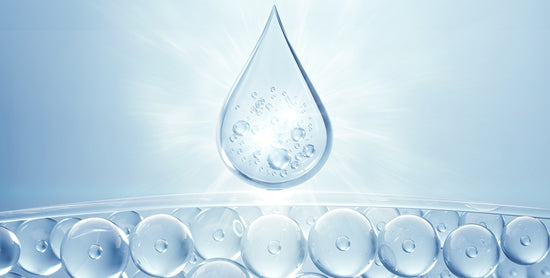Have you ever wondered how aging affects skin with eczema? You’re not the only one. As we age, our skin undergoes significant changes that can leave us feeling vulnerable and frustrated. Your once plump and glowing skin starts to look dull and saggy. You may start to notice the appearance of fine lines and wrinkles.
If you have eczema, these changes will be even more obvious. This is because your already vulnerable skin becomes less resilient and more prone to dryness, irritation and wrinkles. Discover everything about how aging affects your skin, especially if you have eczema, and what you can do to help your skin look brighter so you can feel confident in the skin you’re in.
Aging and Your Skin
You’ve noticed your skin changes with age, but it can be hard to pinpoint exactly what is making you ‘look older.’ This natural aging process is often referred to as intrinsic aging, where multiple changes occur in the skin.
Before we dive into the link between aging and increased eczema flare-ups, here are the science-based changes that occur in your skin when you age.
Your skin becomes thinner with age
One of the most significant changes that occurs with age is your skin becomes thinner. This is due to a number of reasons including UV exposure and slower cell turnover. It’s so related to sun damage, that the areas of thinnest skin are almost always the tops of hands and forearms; areas of high sun exposure.

To be more scientific: The outer layer of your skin, the dermis, is made up of an extracellular matrix. This includes scattered fibroblasts and a network of collagen and elastin. With age, this matrix loses volume.
As your skin becomes thinner, it can appear translucent, making blood vessels appear more visible and your skin attains a see-through or papery appearance. This can lead to skin tearing. Have you heard of hyaluronic acid? It helps your skin withstand shearing forces. But, with age, hyaluronic acid diminishes leading to increased incidences of skin tears and skin trauma.
Dry skin: Your skin loses moisture with age
You’ve probably noticed your skin becomes drier with age. This happens because the number of oil-producing glands in your skin decreases. This reduction in natural oils can make your skin more prone to irritation, itchiness and even more regular eczema flare-ups.
Dry skin also increases with age because your skin barrier loses integrity with age. This leads to transepidermal water loss where moisture seeps out of your skin, leaving it dry and itchy.
How Does Aging Affect Your Eczema?

Eczema-prone skin is already dry, itchy and sensitive. As you age, these symptoms can worsen. And, when your skin's natural oils decrease, it causes even more dryness and flakiness. This can trigger a flare-up as your skin is too depleted of moisture.
Since aging skin is thinner, it’s more prone to inflammation and irritation, which can also trigger eczema symptoms. You may also find that your skin takes longer to heal, making your eczema flare-ups look worse and last longer than they used to.
The Key Link Between Aging and Eczema: Your Skin’s Protective Barrier Changes With Age

Your skin has a built-in protective barrier, known as the epidermal barrier. It acts as a layer of defense against external skin irritants like dry air, harsh heating and itchy fabrics. It also works from the inside out to help your skin retain moisture. The epidermal barrier consists of several layers of cells held together by lipids, which help to maintain its integrity.
As we age, the production of these lipids decreases, causing the barrier to weaken and become more permeable. Think of it like a brick wall. Between each brick is the mortar that strengthens the connections of the wall. With age, the mortar loses its integrity, and gaps begin to form.
Eczema and your skin’s natural barrier: how decreased skin resilience affects your eczema
When you have eczema, the cells in your skin’s protective barrier are less cohesive than those of people who don’t have eczema. In the brick wall analogy, your protective barrier has gaps in the mortar, making the wall slightly leaky. This means more external irritants can get in, and more moisture can leak out.
Since age already causes your skin’s protective barrier to weaken, when you combine eczema and aging, your skin’s layer of defense really suffers. This can cause two issues:
- More regular flare-ups: Irritants more easily permeate your skin, which can trigger an inflammatory response and eczema flare. This also means more hydration can leak out, leaving skin dry and itchy.
- Increased skin infections: You may experience more skin infections with age because of your skin’s compromised epidermal barrier. When your skin’s protective barrier is slightly permeable, bacteria can get through the ‘gaps,’ causing skin infections. Secondly, when you’re in the midst of a flare, your skin’s reduced ability to heal means wounds caused by dry skin cracking or scratching can stay open for longer, leaving you susceptible to infections.
How to Manage Eczema as You Age
Now that you know your eczema flares might continue to worsen with age, you need a long-term strategy. This is where exceptional steroid-free, atopic skin cream comes in. If you have eczema and you’ve noticed how aging affects your skin, you’ve likely tried every eczema cream or product you can find. You’ve heard it all. But what you probably haven’t tried is clean-label skincare with medical-grade performance that gets to the source of skin irritation.
Top Skincare for Managing Eczema and Aging Skin
There are many easy lifestyle changes you can incorporate into your daily routine to help manage eczema and aging skin. This includes using daily sun protection, drinking enough water and avoiding eczema triggers and irritants. However, one of the most important tools is using the right skincare.

When it comes to treating eczema, ingredients matter. That’s why dermatologists and pediatricians recommend ARCTIVA Eczema Cream. It’s a non-steroid eczema cream featuring powerful ingredients like:
- Colloidal oatmeal
- Glycolic acid
- Glycolipids
- Vitamins, essential oils and botanicals.
The revolutionary formulation soothes, repairs and rebuilds irritated, damaged skin, while also fighting the signs of aging.
Glycolipid Technology in Eczema Cream
The most notable breakthrough ingredient is HYDROSURF™ glycolipid technology, a blend of fermented skincare ingredients. HYDROSURF supports the skin barrier, improves hydrology of the skin and enhances moisture retention–all of which are crucial in addressing both eczema and aging. This exclusive HYDROSURF glycolipid technology can only be found in ARCTIVA skincare products.
Steroid-Free Eczema Cream with Proven Results
Not only does ARCTIVA Eczema Cream have the National Eczema Association Seal of Acceptance, but it also has proven results. In a recent trial of people with medically diagnosed eczema, 91% of people reported the cream made their dry skin feel well-hydrated, calmer, healthier, and soothed. When applied twice daily, the ARCTIVA Eczema Cream is a powerful strategy you can use to arm your skin against the effects of aging.
The aging process takes its toll on your skin, leaving it more vulnerable to eczema and other skin problems. Boost your skin’s protective barrier by using a powerful steroid-free eczema cream for daily treatment and prevention of eczema flare-ups. And don’t forget your sunscreen and hydration. By taking care of your skin, you can keep it healthy and glowing, well into your golden years.
Shop ARCTIVA Eczema Cream for Relief
Get relief beyond the surface and start your healing journey today.






